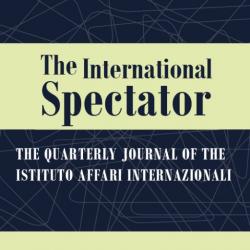GCC-US Alliance-Making Reconsidered: The Travails of Dependency

Donald Trump’s presidency may have altered less in relations between the United States and the Gulf Cooperation Council than recent accounts suggest. Instead, power relations between the US and its Gulf allies have long been, and continue to be, asymmetrical. Dependency theory and postcolonial analysis illustrate the ways in which the US global hegemon exhibits hierarchy, exerting control over Gulf economic resources (oil) and extending its ‘security umbrella’ (e.g. weapons sales and bases) – all in highly unequal dynamics. A critical discourse analysis of American and Saudi speeches during the 2017 Riyadh summit further confirms this assessment. This raises questions about alliance-making and alliance-maintenance norms of promise-keeping and reciprocity.
Keywords: GCC, Kingdom of Saudi Arabia, alliances, US foreign policy, dependency, norm-making
-
Details
The International Spectator, Vol. 55, No. 2, June 2020, p. 49-64 -
Issue
55/2 -
ISBN/ISSN/DOI:
10.1080/03932729.2020.1741269


